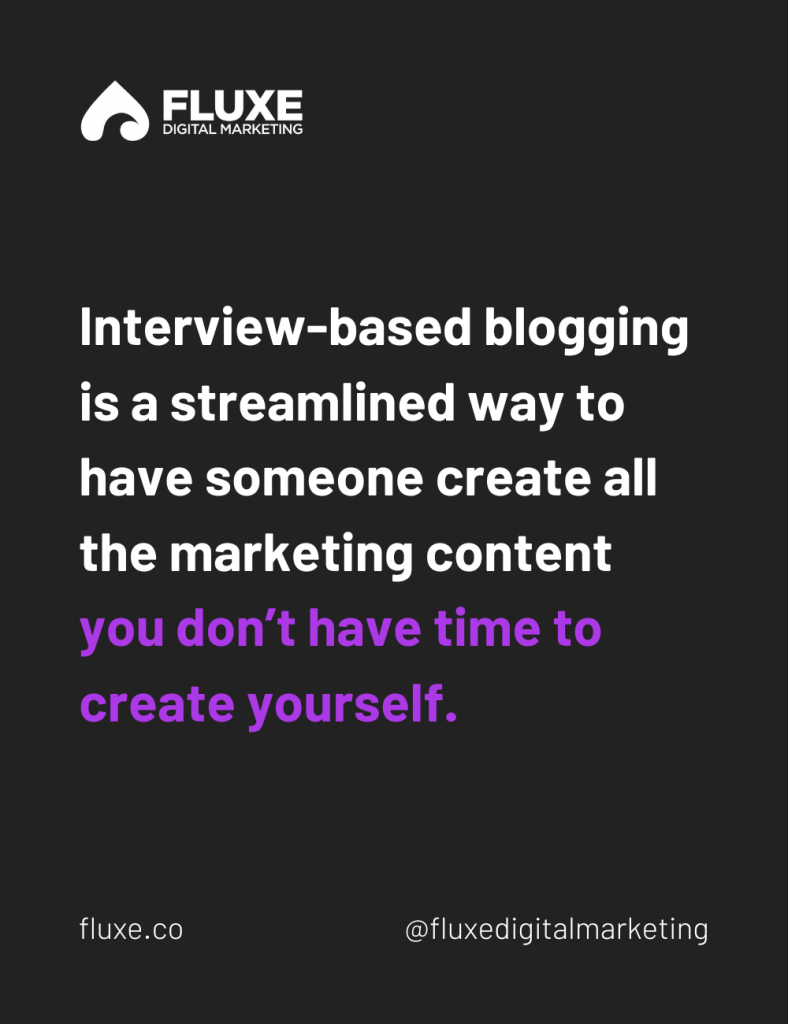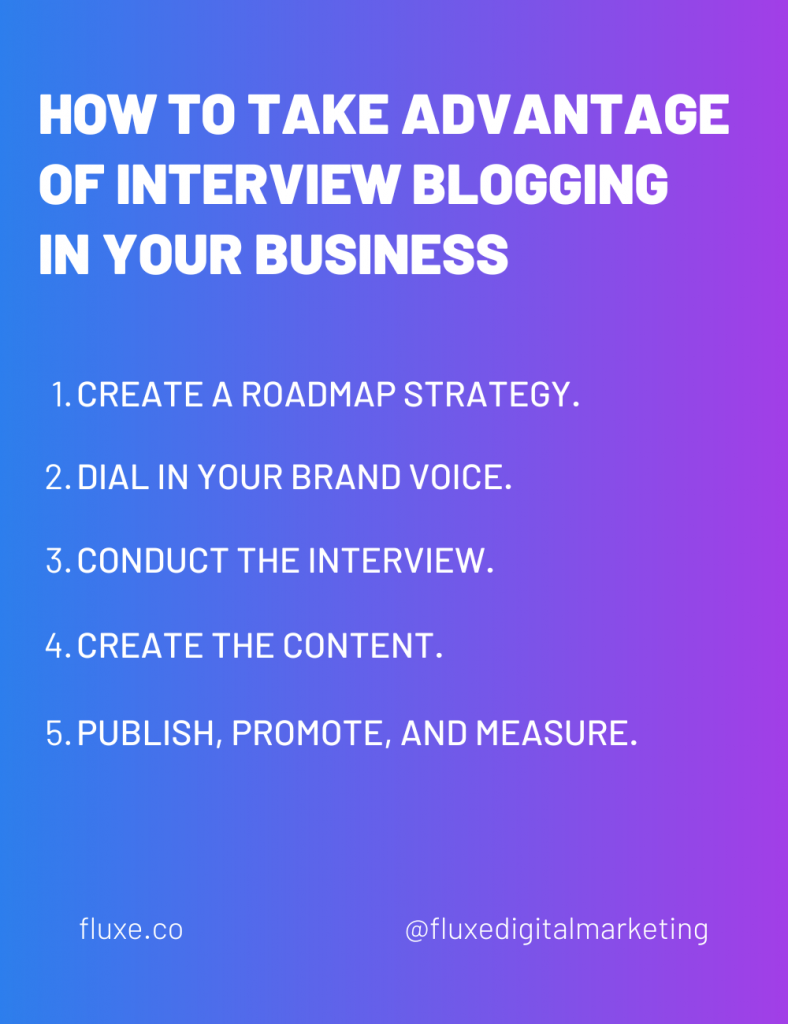Every business coach, thought leader, specialty ecommerce store, service provider, and SaaS business needs content marketing.
Most of these businesses already know they need content, but do they commit to creating it consistently?
Of course not. If I did everything I knew I needed to do, my car’s oil would be changed every 3,000 miles, I’d floss twice a day, and I’d have six-pack abs. (And so would you).
Consistently creating and publishing content marketing falls into that “should’ve-but-didn’t” category, and it’s easy to see why. When you stare at that blank page trying to find things to write, it’s like your brain shuts off. Or, you struggle to articulate complex concepts in a way that’s easy for your readers to understand.
Or, you just don’t have the time. (This is usually the biggest reason business owners don’t follow through with a content marketing strategy.)
Buckling down and creating content isn’t easy. I remember sitting in a coffee shop with a client years ago, waiting for the latest excuses about why he hadn’t written a word since our last meeting.
I was about to give up on him (and my entire business) when I decided to try something new. Instead of telling him how to write each blog post, I asked him a bunch of questions about the topics and recorded the whole thing.
Before I knew it, we had everything we needed to create his content for him for the entire month. It worked so well that I created a process called “Interview-Based Blogging” and built my business around it.
What Is Interview-Based Blogging?
Interview-based blogging is a streamlined way to have someone create all the marketing content you don’t have time to create yourself.
In a one-hour interview call, we ask our clients questions about strategically chosen topics. Then, we use their answers to craft all their content for the month.
The interview is a simple back-and-forth conversation, similar to a podcast. Our clients love the efficiency, their audience loves the authenticity, and we love connecting our clients to their audiences better than ever before.

Why Interview-Based Blogging Works
So, why does interview-based blogging work so well? Here are just 10 of the reasons:
1. It Helps You Identify and Articulate Your Unique Expertise
Every subject matter expert has knowledge they don’t realize the uniqueness of.
Experts work in their fields for so long that they develop deep, valuable knowledge. They use this expertise daily, often on autopilot, never thinking about it outside of simply getting their work done.
But while they may not value it, their target customer does.
Let’s say you’ve worked on something for several hours. This particular task is specialized, but it’s second nature to you. Even with your mind wandering while you work, you still do it better than anyone else.
This is your unique expertise.
Now, a client calls you with an “urgent” question about that very thing. As you explain it, they hang on every word you say, trying to keep up. Meanwhile, you get bored of hearing yourself talk because you’ve repeated this a million times.
You’re just too close to your craft.
Most business owners don’t realize they could leverage this specialized knowledge 10 times more effectively to become a well-respected thought leader and get new clients…
…until interview blogging helps them recognize the value of their expertise.
2. It’s Written in Your Voice
Have you ever outsourced your content writing to someone who misunderstood your voice and tone? It’s not a bad article, but it sounds nothing like you.
It doesn’t feel good to publish content your readers know was written by someone else.
With interview-based blogging, this isn’t a problem. The writers don’t blend your notes with three other generic articles they found after a three-second Google search. They use your voice, your knowledge, and your words.
Remember, you’re still the one creating the content, unlike in traditional ghostwriting, where a third-party writer creates the content from an outline and research.
In interview-based blogging, professional writers take your words, amplify them, and optimize them for the channel where they’re published, whether that’s via blog, email, ebook, infographic, or social media.
3. It Increases Your Efficiency Up to 300%
Did you know talking is roughly 300% faster than typing? That’s what the brilliant minds at Stanford found:
“…with speech recognition, the English input rate [is] 2.93 times faster…than the keyboard for short message transcription under laboratory conditions for both methods…”
Interview-based blogging leverages the difference between speaking and typing. That’s how you can create an entire month’s worth of content in only one hour.
Of course, the writing and editing done behind the scenes take substantially longer, but for the expert being interviewed, it’s just 60 minutes or so.
Now, compare this to creating content the traditional way. You’ll still spend at least one to two hours writing the first draft of a blog post, and that’s on the low end. Writers often spend 4+ hours on a single post.
That doesn’t include editing, graphic design, content research, keyword research, topic selection, uploading, formatting, and content promotion.
4. It Frees You Up to Focus on the Concepts, Not the Writing
If you’re a fantastic writer who cranks out content like a machine uninhibited by time constraints, I’m jealous.
For the rest of us, it’s not that easy. We can brainstorm and discuss concepts until we’re blue in the face, but when it’s time to turn them into an article, we hit a wall.
Most of us get stumped trying to articulate those concepts perfectly. Then, we get stuck in a cycle of writing a sentence, analyzing it, second-guessing ourselves, rewriting the sentence, etc.
You’re not the only one suffering from “blank-screen syndrome.” Here are just a few famous authors who preferred talking over typing:
- Winston Churchill published all his books and articles by dictating them to his secretary.
- James Patterson dictates most of his books over the phone to his secretary.
- Stephen Covey, Jack Welch, and Richard Branson all used interviews with ghostwriters to write their books.
- Ian Fleming, creator of James Bond, dictated his books to a writer.
Interview blogging removes the writing part, freeing you up to do what you’re already great at — communicating concepts by talking through them.
As for the writing, there’s an entire team handling that aspect. Each interview blogging client has a dedicated content strategist, writer, editor, content manager, SEO expert, and graphic designer.
5. You Get to Work Within a Proven Framework
Our clients love the repeatable, easy-to-follow framework we use for every batch of content.
They don’t have to develop a new content strategy every month.
They don’t have to do their own SEO research to find hot new keywords.
They don’t have to sort through their calendar to find a time for the monthly interview.
They don’t have to experiment with headlines.
They don’t have to proofread content for embarrassing typos or grammar mistakes.
They don’t have to create images and graphics for each post.
They don’t have to wonder whether their content gets promoted through social media.
It’s all taken care of in a systemized process.
6. It’s an Opportunity to Flesh Out Your Ideas
Entrepreneurs are never short on ideas.
Unfortunately, most of these ideas don’t make it out of infancy. They’re the start of something great, but they never get fleshed out to reach maturity.
Interview-based blogging is an idea incubator. An interview is the perfect environment to turn uncultivated ideas into full-fledged intellectual property.
Your entire thought process becomes clearer when you have someone to talk to — someone who listens strategically and challenges you to go deeper.
7. It Creates Deeper, More Engaging Content
Because interview blogging is based on two-way conversations, it’s not dependent on you.
A good interviewer puts themselves in your prospect’s shoes and probes deeper into interesting topics you might overlook. What might be obvious to you could be life-changing to your target audience.
By putting themselves in your target audience’s shoes, an interviewer can pivot the conversation to flesh out important concepts that weren’t originally planned.
Some of the best content we’ve created for clients came from conversations that took a left turn. You can’t reproduce this kind of spontaneity in isolation.
8. You Bypass Second-Guessing Syndrome
In the middle of a project, leaders often zoom out and look at the big picture to make sure their team is still on track. But this skill comes back to bite us when we sit down to write content.
It’s far too easy to get stuck in the editing-while-writing trap. We write a sentence, analyze it, rewrite it, and analyze it again. We worry that this one statement doesn’t fit in the overall picture, so we overthink it and finally delete it in frustration.
During an interview, you don’t have time to overthink your statement. In the middle of a conversation, you’re focused on articulating your ideas, not judging them.
When speaking to someone who’s asking for advice, the brain automatically flips into problem-solving mode. This removes the focus from yourself and leaves no room for overthinking.
This is exactly what happens if you’re a high-performer who thrives under pressure. It’s why you’re so productive.
9. Massive Leverage: One Conversation Produces Dozens of Pieces of Content
I’ve said a one-hour phone call can turn into a month’s worth of content, but what does that look like on a practical level?
A single interview blogging session can produce:
- 4 blog posts, 8 social media updates, and 4 quote cards, or
- 2 blog posts and 1 lead magnet, or
- 3 blog posts and 1 infographic, or
- 1 full-service e-book guide, or
- 1 seven-part email sequence
Those are just a few examples.
This is only the initial content. It doesn’t take into account repurposing. Depending on the strategy that’s right for your business, a one-hour interview could create countless content combinations.
10. You’ll Actually Look Forward to It
After a few months, our clients go from dreading content deadlines to looking forward to their scheduled interviews.
Because they can focus on what they do best — articulating their ideas — interviews are a time to flesh out new thoughts and transform them into intellectual property.
Interview-based blogging puts you in your best state of mind and helps you generate your best ideas. Those ideas become content that converts your audience into new clients.
That’s invigorating and worth looking forward to.

How to Take Advantage of Interview Blogging in Your Business
Ready to put interview-based blogging to work in your business? Here’s a quick overview of the process and, below that, a detailed guide with comprehensive information for each step.
1. Create a Roadmap Strategy
You may be tempted to skip this step and get straight to writing, but if you do, you’ll end up writing in circles.
Instead, do keyword research, map out those regular prospect questions, and plan your cornerstone content.
2. Dial in Your Brand Voice
Have your content team read as much of your written material as possible and take notes on what makes it authentically you.
Then, share what you think is missing from their research. Include everything in a brand voice guide document that’ll guide your content thereafter.
3. Conduct the Interview
A good interviewer assumes nothing. They research your product or service beforehand and have empathy for your customers. They’re not afraid to keep you on track, and they’re insightful enough to spot an idea that needs to be fleshed out.
4. Create the Content
Your writers must be familiar with your niche to transform the conversation into content with a logical structure. They’ll need the interview transcript, your brand voice guideline document, and their own research.
After you review the post and they’ve incorporated your feedback, your first post is complete.
5. Publish, Promote, and Measure
Once your team has uploaded the content, it’s time to promote your content on social media.



